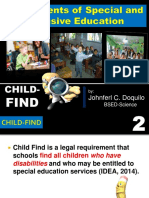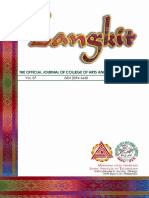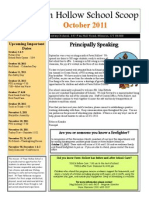0 ratings0% found this document useful (0 votes)
474 viewsTrends and Issues About Sped and Inclusive Education
Trends and Issues About Sped and Inclusive Education
Uploaded by
dilmar deparonThe document discusses 5 current trending issues in special education: technology, teacher licensure, homelessness, twice-exceptional students, and parental support. It provides details on how each issue impacts special education students and teachers. Additionally, it notes that the Philippines Department of Education's request for a dedicated special education budget was rejected for 2019. This has implications for additional facilities, equipment, and training to support special education programs.
Copyright:
© All Rights Reserved
Available Formats
Download as PPTX, PDF, TXT or read online from Scribd
Trends and Issues About Sped and Inclusive Education
Trends and Issues About Sped and Inclusive Education
Uploaded by
dilmar deparon0 ratings0% found this document useful (0 votes)
474 views14 pagesThe document discusses 5 current trending issues in special education: technology, teacher licensure, homelessness, twice-exceptional students, and parental support. It provides details on how each issue impacts special education students and teachers. Additionally, it notes that the Philippines Department of Education's request for a dedicated special education budget was rejected for 2019. This has implications for additional facilities, equipment, and training to support special education programs.
Original Title
Trends and issues about sped and inclusive education.pptx
Copyright
© © All Rights Reserved
Available Formats
PPTX, PDF, TXT or read online from Scribd
Share this document
Did you find this document useful?
Is this content inappropriate?
The document discusses 5 current trending issues in special education: technology, teacher licensure, homelessness, twice-exceptional students, and parental support. It provides details on how each issue impacts special education students and teachers. Additionally, it notes that the Philippines Department of Education's request for a dedicated special education budget was rejected for 2019. This has implications for additional facilities, equipment, and training to support special education programs.
Copyright:
© All Rights Reserved
Available Formats
Download as PPTX, PDF, TXT or read online from Scribd
Download as pptx, pdf, or txt
0 ratings0% found this document useful (0 votes)
474 views14 pagesTrends and Issues About Sped and Inclusive Education
Trends and Issues About Sped and Inclusive Education
Uploaded by
dilmar deparonThe document discusses 5 current trending issues in special education: technology, teacher licensure, homelessness, twice-exceptional students, and parental support. It provides details on how each issue impacts special education students and teachers. Additionally, it notes that the Philippines Department of Education's request for a dedicated special education budget was rejected for 2019. This has implications for additional facilities, equipment, and training to support special education programs.
Copyright:
© All Rights Reserved
Available Formats
Download as PPTX, PDF, TXT or read online from Scribd
Download as pptx, pdf, or txt
You are on page 1of 14
TRENDS AND ISSUES
ABOUT SPED AND
I N C L U S I V E E D U C AT I O N
FIVE CURRENT TRENDING ISSUES IN
SPECIAL EDUCATION
• Technology
• Teacher Licensure
• Homelessness
• Twice-Exceptional Students
• Parental Support
TECHNOLOGY
• technology can support students in overcoming a
variety of challenges and limitations. Innovative
educators, as well as developers, are attempting to
create and use technology to level the playing field
and provide opportunities to students that they
might not have had before.
• Technology has the potential to provide a bridge for
special education students and instructors, allowing
educators to customize materials for unique needs and
drive personalized instruction.
• By using existing technology in new and alternative ways,
special education teachers can help offer students more
ways to be successful. Creative approaches to instruction
and differentiation for individual learning styles are
especially important in order to achieve success.
TEACHER LICENSURE
• There is a shortage of teachers across the country,
and in some states, it’s becoming a critical shortage.
Teachers of special education are in especially short
supply.
• categorical vs. non-categorical licensure for special
education teachers
HOMELESSNESS
• This is a challenge being faced by more students than you
might expect, and under new Every Student Succeeds Act
(ESSA) requirements, increased focus is being placed on
monitoring the academic growth of this specific population.
• For homeless students, the classroom could be the one safe,
stable place in their day-to-day lives, an important tether to
the safety and security of routine and, perhaps most critically,
an essential support in the journey out of poverty and into a
better situation.
• These students are being forced to deal with
significant, difficult, and interrelated challenges
outside of the classroom that inevitably impact
academic performance and the ability to participate
in instruction.
TWICE-EXCEPTIONAL STUDENTS
• One of the challenges teachers face, in addition to
everything else on their plates, is providing material
that is appropriate in content and grade level for
every child.
• When discussing students with special needs, this
can often refer to age-appropriate and skill-
appropriate content.
• Twice-exceptional (or “2E”) students demonstrate
significantly above-average abilities in certain academic
areas but also show special educational needs, such as
ADHD, learning disabilities, or autism spectrum disorder.
• Because their giftedness often masks their special needs,
or vice versa, they are sometimes labeled as "lazy" or
"underperforming," even though that is not the case.
PARENTAL SUPPORT
• one common theme that was not discussed is the
approach that must be considered when meeting with
parents.
• You, as their child’s teacher, may be the very first person
to indicate that there is an issue with their precious baby.
Starting the conversation is hard—you can be met with
tears or terror. The main thing to consider is that this is
their child and that you only know one small piece of the
puzzle.
• It is important from the beginning that you are part of the one
unified team that supports students in the best way possible. At the
end of the day, you and your students’ parents want the best for
the children, and it’s important to remember that.
• You play an important role in students’ lives, so make sure that
- you’re making your voice heard, but be sure that you’re listening to
what parents have to say.
- Keep children’s best interests in mind. Remember, you are an
advocate, but they are the parents.
- Create a plan that you can all agree on—one that will find students
where they are.
ISSUE/S IN THE PHILIPPINES ABOUT
SPED
The request of the Department of Education (DepEd) for
an additional and dedicated fund for special education
(SPED) programs in 2019 was rejected.
Sevilla said the DepEd had requested to include a special
budget line item for SPED programs worth P562 million in
its proposed 2019 budget, but that this was not
considered by the Department of Budget Management
(DBM).
• “What we were requesting was to have a separate
line item that we call special education program and
that is not existing right now in the budget of
DepEd,” she said.
• Although funding for SPED is included in the MOOE,
Sevilla also said this was not enough to provide for
additional faciltiies, equipment, and training in the
proposed program.
REFERENCES:
• https://blog.edmentum.com/five-trending-issues-special-education
• https://blog.edmentum.com/five-current-trending-issues-special-
education
• https://www.rappler.com/nation/209118-additional-funds-special-
education-programs-department-education-rejected
You might also like
- Academic Calendar SY2011-2012 (Ateneo)Document19 pagesAcademic Calendar SY2011-2012 (Ateneo)Wowie CatabijanNo ratings yet
- Final PPT in Educ 2 Group 1Document65 pagesFinal PPT in Educ 2 Group 1Shailyn Consulta100% (1)
- Background of The StudyDocument2 pagesBackground of The StudyRowena Jumao-asNo ratings yet
- Stages Speech Language Development Chart001 PDFDocument1 pageStages Speech Language Development Chart001 PDFAini SkyNo ratings yet
- Policies and Guidelines of SPED in The PhilippinesDocument3 pagesPolicies and Guidelines of SPED in The PhilippinesAnne MarielNo ratings yet
- Transition Program: Philippine Model: Yolanda S. Quijano, ED.DDocument6 pagesTransition Program: Philippine Model: Yolanda S. Quijano, ED.DSheela Marasigan PagkalinawanNo ratings yet
- Teaching Learners With Physical Disabilities and Other Health ImpairmentsDocument26 pagesTeaching Learners With Physical Disabilities and Other Health ImpairmentsAx El100% (2)
- Introduction To Special EducationDocument10 pagesIntroduction To Special EducationMaridel Mugot-DuranNo ratings yet
- Pre Vocational Package PresentationDocument13 pagesPre Vocational Package Presentationharry meana100% (1)
- The Mighty Odds Chapter SamplerDocument14 pagesThe Mighty Odds Chapter SamplerAbrams Books0% (2)
- Distinguish The Basic Terms in Special Education From Each OtherDocument2 pagesDistinguish The Basic Terms in Special Education From Each OtherMARICRIS LLANO100% (2)
- Child Find, AssessmentDocument29 pagesChild Find, AssessmentJohnferl DoquiloNo ratings yet
- A Narrative Report On Mental Health and Psychological Support and Services RJCC REALDocument1 pageA Narrative Report On Mental Health and Psychological Support and Services RJCC REALRoxanne Jessa CatibogNo ratings yet
- Assessment Checklist On Different ChildDocument15 pagesAssessment Checklist On Different ChildRuth Well100% (1)
- BIR Behavior Intervention ReportDocument4 pagesBIR Behavior Intervention ReportMichelle Tamayo TimadoNo ratings yet
- Individualized Education Program (Iep) : Maine Unified Special Education Regulations (MUSER) IX.3.GDocument12 pagesIndividualized Education Program (Iep) : Maine Unified Special Education Regulations (MUSER) IX.3.GIbtisam Marohombsar AlontoNo ratings yet
- Detailed Lesson PlanDocument9 pagesDetailed Lesson PlanBethany Faith BatalunaNo ratings yet
- School Based Management SBMDocument16 pagesSchool Based Management SBMAngel PendonNo ratings yet
- Kindergarten Today Meeting Academic and Developmental NeedsDocument28 pagesKindergarten Today Meeting Academic and Developmental Needs57v7rj7hrb100% (1)
- Reflection Paper On Lecture Series 2 - Teaching Deaf Students Physical EducationDocument2 pagesReflection Paper On Lecture Series 2 - Teaching Deaf Students Physical EducationCatherine Sagario OliquinoNo ratings yet
- Introductions To Anthropological FoundationsDocument6 pagesIntroductions To Anthropological Foundationsangelito100% (2)
- The Multiage Concept ExplainedDocument61 pagesThe Multiage Concept ExplainedAndromedaKenNo ratings yet
- Smogometer Academic PaperDocument8 pagesSmogometer Academic PaperRobert Jacome100% (1)
- Pillars of SPED 141 101Document24 pagesPillars of SPED 141 101Judy Ann Gatchalian PateñaNo ratings yet
- DLL - Care SKILLS - Q1-Week 1Document2 pagesDLL - Care SKILLS - Q1-Week 1Danilo Lagasca100% (1)
- Emotional or Behavioral DisorderDocument13 pagesEmotional or Behavioral Disorderapi-385985512No ratings yet
- Field Trip Lesson PlanDocument5 pagesField Trip Lesson Planapi-268404591No ratings yet
- Middle Childhood (The Primary Schooler) : Name: Sudani Bhavika NarshibhaiDocument25 pagesMiddle Childhood (The Primary Schooler) : Name: Sudani Bhavika Narshibhai216 SUDANI BHAVIKA NARSHIBHAINo ratings yet
- Physical Disabilities Health ImpairmentsDocument15 pagesPhysical Disabilities Health ImpairmentsGeronimo Mark JosephNo ratings yet
- Final Examination Sped 605Document10 pagesFinal Examination Sped 605Nazardel alamo100% (1)
- Sped and AlsDocument20 pagesSped and Alsrose dianne reyesNo ratings yet
- Visual and Hearing Impairment IEPDocument5 pagesVisual and Hearing Impairment IEPSavShelleNo ratings yet
- Historical Timeline On The Development of Special and Inclusive EducationDocument3 pagesHistorical Timeline On The Development of Special and Inclusive EducationJiarah AcayNo ratings yet
- Rubric For Condusive Conducive Classroom EnvironmentDocument2 pagesRubric For Condusive Conducive Classroom EnvironmentnazifahsiNo ratings yet
- Guidance and Counselling NeedsDocument2 pagesGuidance and Counselling NeedsSowndharya SNo ratings yet
- Orthopedic ImpairmentDocument2 pagesOrthopedic Impairmentapi-236207623No ratings yet
- Inclusive Lesson Plannig and Instructional StrategiesDocument22 pagesInclusive Lesson Plannig and Instructional Strategiesmagdumsandeep100% (2)
- Challenges of The Students in Online ClassesDocument25 pagesChallenges of The Students in Online ClassesJunaisa Mimbalawag MercadoNo ratings yet
- Special Education ReviewerDocument14 pagesSpecial Education ReviewerGuiang, Maezynelle P.No ratings yet
- ENGLISH4 ProperCommonNounDocument5 pagesENGLISH4 ProperCommonNounMickey BautistaNo ratings yet
- Assessment and Identification of EbdDocument7 pagesAssessment and Identification of EbdRinz Christian PerochoNo ratings yet
- IEP For Learners With Difficulties in Walking and MovingDocument3 pagesIEP For Learners With Difficulties in Walking and MovingMaryJoy Bautista Orcine100% (1)
- Assessment in Special EdDocument27 pagesAssessment in Special EdAlfred IntongNo ratings yet
- Distance - Learning WorksheetDocument3 pagesDistance - Learning Worksheetmhanny GarciaNo ratings yet
- Group 2 Home - EconomicsDocument17 pagesGroup 2 Home - EconomicsRaymart EstavilloNo ratings yet
- Characteristica of Gifted and Talented LearnersDocument14 pagesCharacteristica of Gifted and Talented LearnersRuth Jane ConejosNo ratings yet
- Involvement of Parents in School Programs: A Phenomenological StudyDocument14 pagesInvolvement of Parents in School Programs: A Phenomenological StudyPsychology and Education: A Multidisciplinary JournalNo ratings yet
- Program and Services PDFDocument36 pagesProgram and Services PDFNNo ratings yet
- Comparative StudiesDocument66 pagesComparative StudiesJasmin CaballeroNo ratings yet
- Reflection 2 PhychologyDocument3 pagesReflection 2 PhychologynitiyahsegarNo ratings yet
- History of Inclusiveeducation in The Philippines: by Group 3: Molina, Rheamar Angel L. Baldemor, Franky Z. Beced - 3Document17 pagesHistory of Inclusiveeducation in The Philippines: by Group 3: Molina, Rheamar Angel L. Baldemor, Franky Z. Beced - 3Rheamar Angel MolinaNo ratings yet
- Universal Design For Learning PPT PresentationDocument27 pagesUniversal Design For Learning PPT Presentationkstone5No ratings yet
- Introduction To Special EducationDocument22 pagesIntroduction To Special EducationAnabelle Talao-UrbanoNo ratings yet
- Transfer StageDocument3 pagesTransfer StageMuarri FahNo ratings yet
- Lesson Guide Grade 4 English Quarter 1 Week 8Document21 pagesLesson Guide Grade 4 English Quarter 1 Week 8Gom BearNo ratings yet
- Sped 601 - Activity 12Document7 pagesSped 601 - Activity 12Maricris Llano100% (1)
- Physical Barriers in Inclusive EducationDocument4 pagesPhysical Barriers in Inclusive EducationArnav100% (2)
- Intervention Strategies Utilized by Elementary Mathematics Teachers and Their Perceived Effectiveness in Enhancing Learners' PerformanceDocument13 pagesIntervention Strategies Utilized by Elementary Mathematics Teachers and Their Perceived Effectiveness in Enhancing Learners' PerformancePsychology and Education: A Multidisciplinary JournalNo ratings yet
- Embracing Special EducationDocument46 pagesEmbracing Special EducationNowmee DanlogNo ratings yet
- Consequences of Eating Healthful and Less Healthful FoodDocument9 pagesConsequences of Eating Healthful and Less Healthful Foodjuashong leeNo ratings yet
- Educating Learners With Visual Impairment In ZambiaFrom EverandEducating Learners With Visual Impairment In ZambiaRating: 5 out of 5 stars5/5 (1)
- Homeroom Guidance Report Quarter 1 Grade-3-FaithDocument20 pagesHomeroom Guidance Report Quarter 1 Grade-3-FaithSeph TorresNo ratings yet
- Wimbledon High School GDST - UK League Table - The Times and The Sunday TimesDocument3 pagesWimbledon High School GDST - UK League Table - The Times and The Sunday TimesgetloannowukNo ratings yet
- Lapidary. RIM: Gem Stones 1.-+rDocument26 pagesLapidary. RIM: Gem Stones 1.-+rSilviu AndoneNo ratings yet
- Assam University:: Silchar: 5TH SEMESTER Examination, December 2018 (BACHELOR OF SCIENCE)Document2 pagesAssam University:: Silchar: 5TH SEMESTER Examination, December 2018 (BACHELOR OF SCIENCE)Rupam1No ratings yet
- Solutions Manual Abstract Algebra HersteinDocument2 pagesSolutions Manual Abstract Algebra HersteinPriyansh Agrawal25% (28)
- Varayti Pananaliksik PDFDocument144 pagesVarayti Pananaliksik PDFFelipe Beranio Sullera Jr.No ratings yet
- Stephanie Hendrickson - Resume 3 17 16Document1 pageStephanie Hendrickson - Resume 3 17 16api-235095894No ratings yet
- My ResumeDocument2 pagesMy Resumeapi-356307199No ratings yet
- Ma Psychology - T.u-Semester System.Document7 pagesMa Psychology - T.u-Semester System.divine_madman100% (1)
- Exam Porenjer ADocument2 pagesExam Porenjer ALove BatoonNo ratings yet
- NTA DU Assistant Answer KeyDocument54 pagesNTA DU Assistant Answer KeySRIPRASAD SATAPATHYNo ratings yet
- Med 10Document4 pagesMed 10Violet DV Balino100% (1)
- FS 1Document25 pagesFS 1Maira Lyn DupraNo ratings yet
- Get The School and the University Burton R. Clark (Editor) PDF ebook with Full Chapters NowDocument50 pagesGet The School and the University Burton R. Clark (Editor) PDF ebook with Full Chapters Nowolickgozumft100% (2)
- Faith Independent, January 9, 2013Document12 pagesFaith Independent, January 9, 2013surfnewmediaNo ratings yet
- 233 - Facial Recognition Technology - Current Capabilities, Future Prospects, and GovernanceDocument161 pages233 - Facial Recognition Technology - Current Capabilities, Future Prospects, and Governancescribd.awning407No ratings yet
- Application For Admission To B.E / B.Tech / M.E. College of Engineering & TechnologyDocument2 pagesApplication For Admission To B.E / B.Tech / M.E. College of Engineering & TechnologyBashi YouNo ratings yet
- B2+ UNIT 1 Flipped Classroom Video Worksheet PDFDocument1 pageB2+ UNIT 1 Flipped Classroom Video Worksheet PDFana maria csalinasNo ratings yet
- Dal Gilbert ResumeDocument3 pagesDal Gilbert Resumeapi-271240170No ratings yet
- School Scoop OctoberDocument3 pagesSchool Scoop Octoberapi-54458100No ratings yet
- Documents To Be Carried at The Time of The Visa InterviewDocument3 pagesDocuments To Be Carried at The Time of The Visa Interviewroopakv1990No ratings yet
- Policy PDFDocument4 pagesPolicy PDFanum iftikhaNo ratings yet
- Quarter 4.week 5.english.10. Tamayo AdrianDocument30 pagesQuarter 4.week 5.english.10. Tamayo AdrianLance AustriaNo ratings yet
- Conjectures in GeometryDocument12 pagesConjectures in GeometrySuzy SpNo ratings yet
- Schools of Pharmacy in The Philippines: Alecza Mae C. Savella IcphDocument3 pagesSchools of Pharmacy in The Philippines: Alecza Mae C. Savella IcphAlecza Mae SavellaNo ratings yet
- Bai Tap Tieng Anh Lop 3 Unit 12 JobsDocument3 pagesBai Tap Tieng Anh Lop 3 Unit 12 JobsDương Tú Quyên100% (1)
- Reach Pre Post EvalDocument3 pagesReach Pre Post Evalapi-427436497No ratings yet
























































































